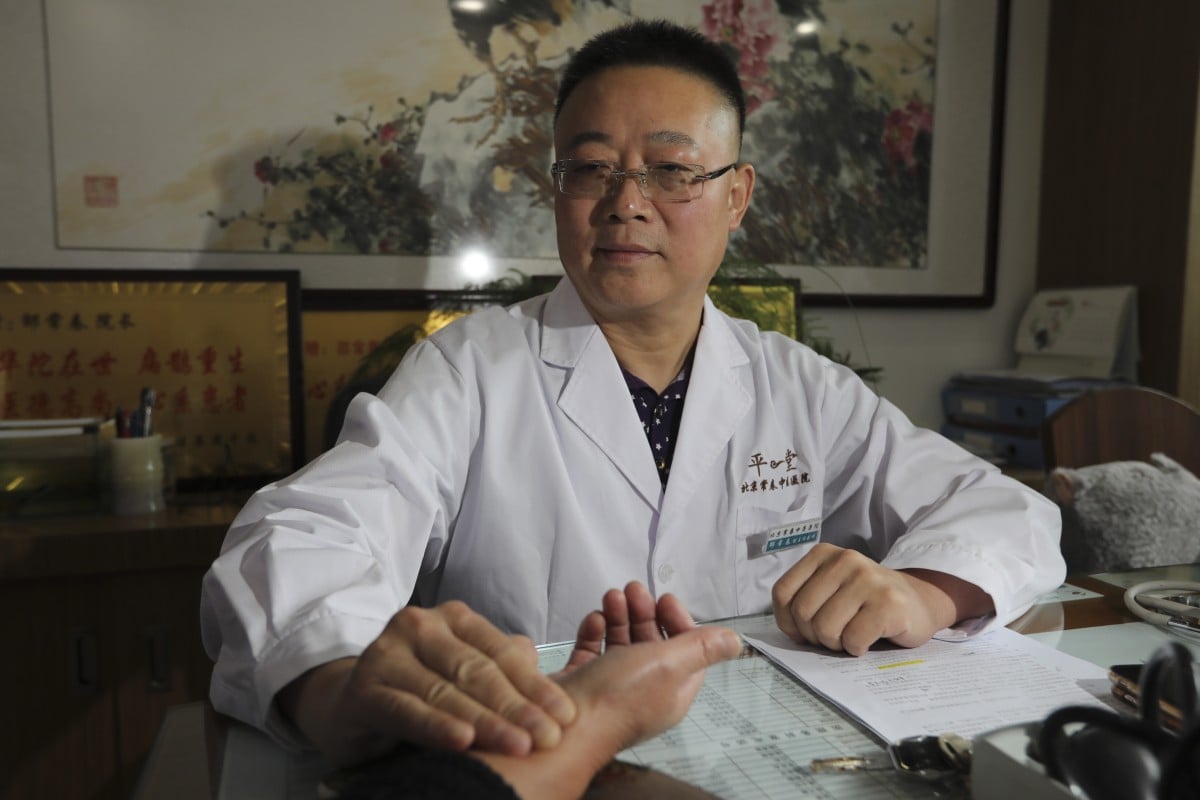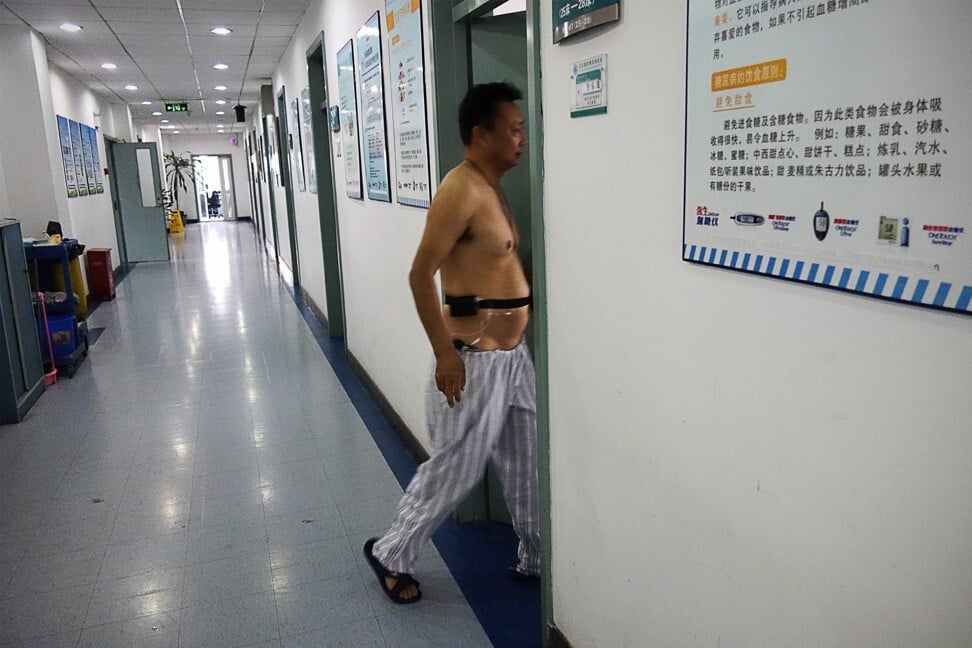
 i_need_contribute
i_need_contribute

Shao Changchun, a traditional Chinese medicine doctor, believes that Type 2 diabetes can be reversed and a patient cured of it. He says nearly half the 130,000 patients he has seen have been cured of diabetes. Photo: Simon Song
While Western medicine sees diabetes as an incurable disease that requires lifelong insulin injection and other medicines to keep it under control, traditional Chinese medicine doctor Shao Changchun begs to differ.
The chief of Beijing Changchun Hospital of TCM in Beijing, set up three years ago to specialise in treating
, says of the 130,000 patients he has treated over the past three decades, almost half – around 60,000 – have been cured of the disease and weaned off medication.
“Most other hospitals in China combine Western and Chinese medicine to treat diabetes. From my knowledge, we are the only one in China which only uses Chinese medicine to treat it,” he says.
In his three-decade career working in hospitals in Yangquan, Shanxi province, before his relocation to Beijing three years ago, the 55-year-old practitioner came to see the pancreas, even a severely damaged one, as an organ capable of regeneration.
Shao adds: “Our hospital only treats Type 2 diabetes, as Type 1 diabetes means the pancreas is completely damaged. Its patients must receive insulin injections to stay alive.”
In spite of the advanced diagnostic tools available now, Shao says it is not easy to distinguish between Type 1 and Type 2 diabetes; in the case of Type 1, the body attacks the cells of the pancreas, which stops it producing enough insulin, while in Type 2 diabetes, the body cannot produce enough insulin, with risk factors including being overweight. The body needs insulin to regulate blood sugar levels.
“When confronted with a severely ill patient, some doctors assume it to be Type 1. Most of the misdiagnosed cases involve adolescents, especially children, as they display severe symptoms when they seek medical treatment,” Shao says. One symptom is diabetic ketoacidosis – when the body starts breaking down fat at a rate that is too fast, and the liver processes the fat into a fuel called ketones, which causes the blood to become acidic.
Shao says a top hospital in Beijing diagnosed the nephew of its chairman, Fang Zhijiang, as suffering from Type 1 diabetes. He had been given insulin since the age of 13, and began to suffer developmental problems at 19 as a side effect of insulin injection. Shao treated him and claims the young man was cured.
“After his recovery, I cured Fang’s father and some of his friends, too. Fang thought the treatment worthy of being promoted, and suggested setting up this hospital,” Shao says, adding he was invited to head it.

A man walks into a ward at a diabetes hospital in Beijing in 2013. Shao says it is not easy to distinguish between Type 1 and Type 2 diabetes. Photo: AFP
Chinese medicine uses a holistic approach, starting from the cause, when treating diabetes.
“Western medicine only reduces the blood sugar levels by disintegrating the sugar in blood temporarily. It doesn’t treat the pancreas in itself,” Shao says.
“Chinese medicine tries to regenerate the pancreas. Patients need tailor-made treatments. In general, a patient coming in to see me will be prescribed herbal medicine. They can stop taking Western medicine within a month,” and can be weaned off herbal medicine within half a year, too.
Studies suggest the pancreas may well indeed be regenerated. In a 2017 study published in the journal Cell, mice put on a fasting diet were shown to be able to regenerate their pancreas. Early lab studies involving human cell samples have shown similar potential.
Besides herbal medicine, treatment includes acupuncture and ionotherapy, in which Chinese medicine patches are applied to the skin above acu-points and heated with electrical currents to boost the medicine’s absorption.
In Chinese medicine, the cause of diabetes is wetness and heat. When a person has too much heat, they experience a bitter taste in the mouth, a dry and sore throat, tooth pain, bad breath and frothy urine with a heavy odour. The causes of too much heat can be overeating, which causes a too-hot stomach, or anger, which causes a too-hot liver, or worry, which overheats the heart, Shao says.
To treat the pancreas, Chinese medical practitioners remove heat and damp in a process that lasts about six months.
“Those with more complications might need more time. From my experience, the longer a patient has been ill with diabetes, the faster his recovery. As he has suffered from [taking] medication and discomfort for a long time, he is obedient and exercises much self-discipline regarding his diet and other health management like exercise and emotional control.
“Those who are ill for just a short time are disobedient, as they are not aware of the severity of the problem.”
Patients are advised to stay at the hospital for at least one week to learn how and what to eat, and other holistic care.
Apart from genetic factors, people develop diabetes because of their diet and poor emotions, Shao says. “People who have undergone shocks, severe work injuries or car accidents are prone to have diabetes.
“When working in Shanxi, which produces coal, I saw a patient develop diabetes after a mining accident. He got trapped underground and was confronted with imminent death before being saved. Menopausal women are also prone to it.”
Shao may be passionate about the work at his hospital, but sceptics suggest that more research is needed to back his claims.
Ji Linong, an endocrinologist (a doctor who specialises in glands and hormones) with Peking University People’s Hospital, told medical website Baidu Medical Encyclopaedia that Chinese medicine cannot “cure” diabetes.
“There’s clinical evidence showing that the use of Chinese medicine can put Type 2 patients’ blood sugar levels under control and improve diabetes-related symptoms. [However], whether long-term Chinese medicine treatment can decrease the risk of chronic diabetic complications happening needs further studies and assessment.”
With 50 staff now, Shao says his plan is to develop a multidisciplinary hospital specialising in diabetes.
“Diabetes is not scary in itself. What is scary is its complications. We want to employ specialist doctors to man different departments serving complications from diabetes.” These would include dermatology (skin), ophthalmology (eyes) and cardiology (the heart).
With the use of Chinese medicine credited with curing Covid-19 patients and helping China to control the pandemic’s spread when many parts of the world are still unable to halt it, Shao says Chinese medicine’s efficacy is worthy of global promotion.
“Western medicine is exploring ways to put diabetes into remission. More international recognition for Chinese medicine in treating diabetes [can help in this quest].”